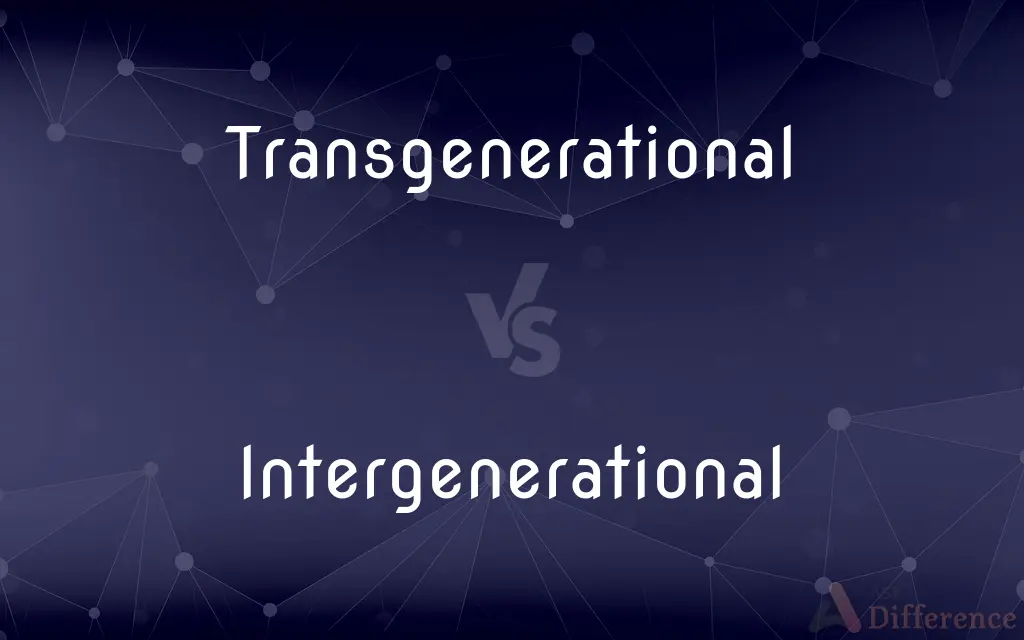Transgenerational vs. Intergenerational — What's the Difference?
By Tayyaba Rehman & Fiza Rafique — Updated on March 19, 2024
Transgenerational involves influences extending across multiple generations, while intergenerational focuses on interactions between two or more generations.

Difference Between Transgenerational and Intergenerational
Table of Contents
ADVERTISEMENT
Key Differences
Transgenerational concepts typically pertain to the transmission of information, traits, or behaviors from one generation to several future generations, often seen in the context of trauma, habits, or genetic characteristics. Whereas, intergenerational interactions involve direct exchanges or relationships between two or more generations, emphasizing the immediate connections and influences, such as in family dynamics, education, or workplace environments.
In the study of genetics, transgenerational inheritance can involve the passing of characteristics not directly encoded in the DNA, through mechanisms like epigenetics, across multiple generations. On the other hand, intergenerational studies might focus on the genetic similarities and differences between parents and their children, or the impact of a parent's genes on their immediate offspring.
Transgenerational trauma, a concept in psychology, refers to trauma that is passed down through generations, potentially affecting individuals who were not directly exposed to the original traumatic event. Intergenerational trauma, while similar, often emphasizes the relational aspects between those who experienced the trauma and their direct descendants, focusing on how these dynamics manifest within family units.
In terms of solutions and interventions, transgenerational approaches might involve long-term strategies aimed at breaking cycles of behavior, trauma, or disease over several generations. Intergenerational strategies, however, are often designed to improve understanding, communication, and relationships between different age groups, such as programs that connect the elderly with the young.
Transgenerational and intergenerational narratives are both important in understanding the continuity and change within families and societies, but they differ in scope and focus. Transgenerational narratives look at the long arc of family or societal histories, while intergenerational narratives are more concerned with the dynamics and relationships between existing generations.
ADVERTISEMENT
Comparison Chart
Definition
Pertains to influences that extend across multiple generations.
Involves interactions or relationships between two or more generations.
Focus
Long-term transmission of traits, behaviors, or information.
Immediate exchanges and influences between generations.
Contexts
Often used in genetics, psychology (e.g., trauma), and social studies.
Common in family dynamics, education, and workplace environments.
Time Span
Involves several future generations beyond the immediate one.
Centers on the current and directly preceding or succeeding generations.
Key Concepts
Transgenerational inheritance, trauma, and cycles.
Intergenerational communication, relationships, and learning.
Compare with Definitions
Transgenerational
Transmission of traits not directly encoded in DNA across multiple generations.
Epigenetic changes inherited from grandparents.
Intergenerational
Knowledge transfer and learning experiences between generations.
A teenager teaching their grandparent to use modern technology.
Transgenerational
Psychological impact extending beyond the direct victims to affect future generations.
The effects of war trauma experienced by a great-grandparent affecting current family dynamics.
Intergenerational
Direct interactions between members of different generations.
A grandparent and grandchild sharing stories and experiences.
Transgenerational
Collective memories or narratives passed down through generations.
Oral histories preserving family or community traditions.
Intergenerational
Differences in values, beliefs, or practices between generations.
Generational debates over political or social issues.
Transgenerational
Repetitive behaviors or cycles observed across several generations.
Recurring patterns of migration in a family lineage.
Intergenerational
Joint efforts or projects involving multiple generations.
Family businesses run by members from different generations.
Transgenerational
The long-term impact of decisions or events on subsequent generations.
Environmental policies affecting future generations' living conditions.
Intergenerational
Mutual support and caregiving roles between generations.
Adult children caring for aging parents while raising their own children.
Transgenerational
Acting across multiple generations
Intergenerational
Being or occurring between generations.
Intergenerational
Between or across generations.
Intergenerational justice
Common Curiosities
How does transgenerational influence manifest in society?
Transgenerational influences can shape societal norms, behaviors, and attitudes over time, affecting collective decision-making, cultural practices, and responses to challenges.
Can intergenerational learning improve workplace dynamics?
Yes, intergenerational learning in workplaces can enhance collaboration, innovation, and understanding, leveraging the diverse skills and perspectives of different age groups.
What are some examples of intergenerational programs?
Examples include mentorship programs connecting retirees with youth, joint educational initiatives, and community projects involving participants from different age groups.
How can intergenerational conflicts be addressed?
Addressing intergenerational conflicts involves promoting open communication, understanding differing perspectives, and fostering respect and empathy between age groups.
How can societies address transgenerational challenges?
Societies can address transgenerational challenges through policies and programs that promote healing, education, and equitable opportunities, breaking cycles of disadvantage.
What is transgenerational trauma?
Transgenerational trauma refers to the psychological effects of trauma being passed down from the original victims to subsequent generations, affecting individuals who weren't directly exposed to the trauma.
How do intergenerational relationships benefit families?
Intergenerational relationships can strengthen family bonds, facilitate knowledge and cultural transfer, and provide mutual support, enhancing emotional well-being across all ages.
Can transgenerational effects be observed in genetics?
Yes, transgenerational genetic effects can occur, where traits or responses not directly encoded in the DNA are passed down to future generations, often through mechanisms like epigenetics.
How do transgenerational patterns affect individual choices?
Transgenerational patterns can influence individual choices and behaviors by establishing certain predispositions, expectations, or perceived limitations based on family or cultural histories.
What impact do intergenerational projects have on communities?
Intergenerational projects can strengthen community ties, bridge generational divides, and enrich social and cultural life by pooling diverse talents and perspectives.
What's the difference between transgenerational and intergenerational trauma?
Transgenerational trauma refers to the long-term passing of trauma effects across multiple generations, while intergenerational trauma focuses more on the direct relational impacts between the affected generation and their immediate descendants.
What role does memory play in transgenerational transmission?
Memory plays a crucial role in transgenerational transmission by preserving and conveying experiences, lessons, and values across generations, influencing collective identities and behaviors.
What are the benefits of intergenerational caregiving?
Intergenerational caregiving can offer emotional, social, and practical benefits, fostering a sense of purpose, belonging, and mutual respect among family members.
Can transgenerational influences be positive?
Yes, transgenerational influences can be positive, such as the transmission of resilience, cultural heritage, and positive values, contributing to the strength and cohesion of future generations.
How does intergenerational dialogue facilitate understanding?
Intergenerational dialogue facilitates understanding by allowing different generations to share their experiences, challenges, and aspirations, promoting empathy and reducing stereotypes.
Share Your Discovery

Previous Comparison
Oneself vs. Anasteemaphilia
Next Comparison
Affiliation vs. FiliationAuthor Spotlight
Written by
Tayyaba RehmanTayyaba Rehman is a distinguished writer, currently serving as a primary contributor to askdifference.com. As a researcher in semantics and etymology, Tayyaba's passion for the complexity of languages and their distinctions has found a perfect home on the platform. Tayyaba delves into the intricacies of language, distinguishing between commonly confused words and phrases, thereby providing clarity for readers worldwide.
Co-written by
Fiza RafiqueFiza Rafique is a skilled content writer at AskDifference.com, where she meticulously refines and enhances written pieces. Drawing from her vast editorial expertise, Fiza ensures clarity, accuracy, and precision in every article. Passionate about language, she continually seeks to elevate the quality of content for readers worldwide.















































